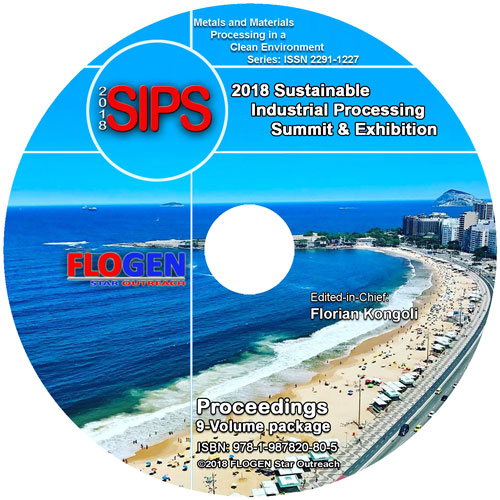2018-Sustainable Industrial Processing Summit
SIPS2018 Volume 9. Energy Production, Secondary Battery
| Editors: | F. Kongoli, H. Dodds, M. Mauntz, T. Turna, V. Kumar, K. Aifantis |
| Publisher: | Flogen Star OUTREACH |
| Publication date: | 23 December 2018 |
| Pages: | 170 pages |
| ISBN: | 978-1-987820-98-0 |
| ISSN: | 2291-1227 (Metals and Materials Processing in a Clean Environment Series) |

CD shopping page
NovoPb - A Complete Lead Recycling System to Enhance Brazilian Sustainability
Deise Menezes Santos1; Yandiara Larissa Barros2; Marcos Benedito Jose Geraldo de Freitas3; André Gustavo de Sousa Galdino4; Matheus Carvalho5; Francklin Jonas De Paula6; Vasant Kumar7;1UNIVERSIDADE FEDERAL DO ESPÃRITO SANTO, Vitoria, Brazil; 2INSTITUTO FEDERAL DO ESPIRITO SANTO, Vitoria, Brazil; 3UNIVERSIDADE FEDERAL DO ESPIRITO SANTO, Vitoria, Brazil; 4INSTITUTO FEDERAL DO ESPÃRITO SANTO, Vitória, Brazil; 5INSTITUTO FEDERAL DE MINAS GERAIS, Governador Valadares, Brazil; 6FACULDADE PITAGORAS, Governador Valadares, Brazil; 7UNIVERSITY OF CAMBRIDGE, Cambridge, United Kingdom ;
Type of Paper: Regular
Id Paper: 385
Topic: 14
Abstract:
Pyrometallurgy lead-acid battery recycling causes pollution and is energy-intensive. This research aims to implement an alternative hydrometallurgical process of recycling lead-acid battery paste, NovoPb, by developing processes to make it economically viable in the current market and to ensure the quality of the newly recycled batteries in a 1 ton capacity pilot plant at Minas Gerais - Brazil.<br />NovoPb is based on a paste-to-paste route using a biomass source, citric acid. The new intermediary lead compound is calcined at a much lower temperature (340°C) than usual smelted lead (1200°C), saving energy and reducing hazardous gas emissions such as Pb and SOx, to directly generates nanostructured PbO for battery paste. <br />The process to be deployed in Brazil has as a first challenge the battery scrap characterisation, to measure the use of reagents per ton of scrap, which is not standard protocol in the current pyrometallurgical process. The study of the characterisation forms will be carried out in the laboratory to define the route to be followed in the pilot plant, which will be built by the British partners.<br />The determination of the optimal reaction conditions will be designed by factorial modelling. The influence of the impurities will be evaluated from a pure standard mixture of the main species that compose the battery paste. The optimization of the pilot process will be carried out by application of artificial neural networks after controlled operation.<br />This research is part of the Embrapii project of the Vitoria Innovation Center of the Federal Institute of Espirito Santo, in partnership with the University of Cambridge, Innovate UK, Brazilian companies Tudor MG de Baterias, Antares Reciclagem LTDA and the British company, Aurelius Technology.